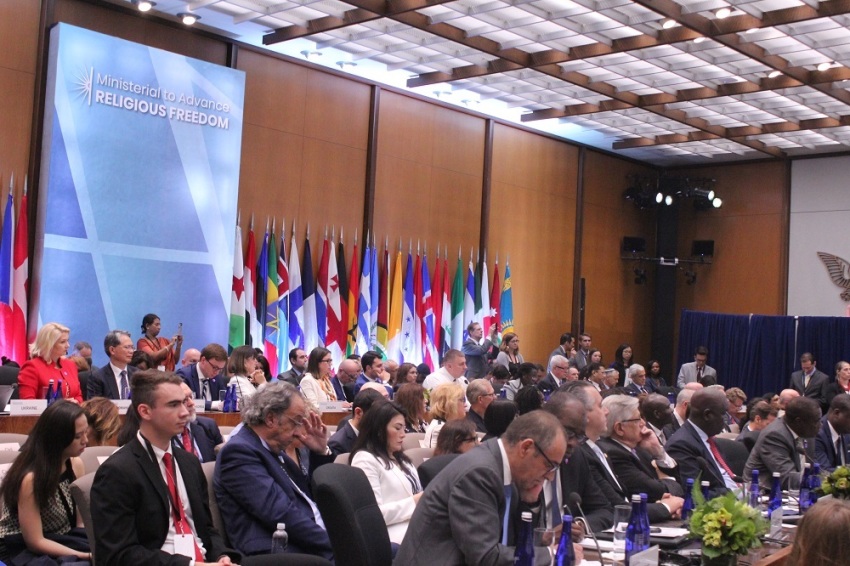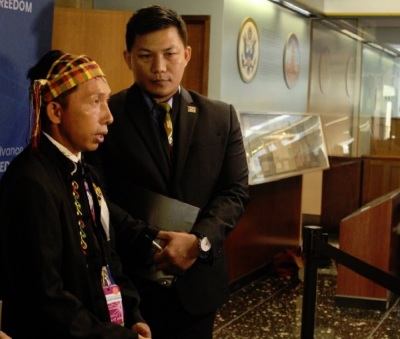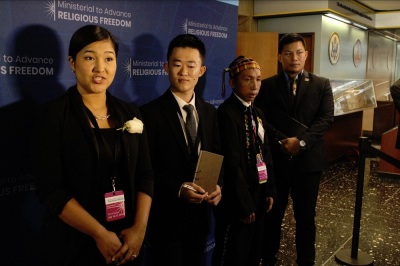'Eyes tied sealed': Kachin pastor details torture in Burmese prison

WASHINGTON — A Christian pastor from northern Myanmar (also known as Burma) opened up about the horrors he faced when jailed and tortured for over a year and welcomed sanctions recently issued by the U.S. government against key military leaders responsible for abuses.
Pastor Langjaw Gam Seng, who was jailed in 2016 for helping journalists report on the bombing of Christian churches in the majority-Christian Kachin province, spoke with reporters about the situation facing Kachin Baptists in Myanmar at the U.S. State Department’s second Ministerial to Advance Religious Freedom, held July 16-18.
While much has been reported about the Myanmar military’s abuses of the Rohingya Muslim community in the Rakhine state, which many advocates have called genocide, the Christian community near the Myanmar border with China have also faced abuses amid renewed fighting between the military and Kachin rebel groups.

Seng served as a youth leader for a Baptist church in the town of Munggu. In 2012, Seng was tortured and jailed by Myanmar officials. He was arrested again on Christmas Eve in 2016 along with church deacon Dumdaw Nawng Lat.
The two men spent 15 months jailed at Lashio Central Prison and were released in April 2018.
Seng told journalists that at the beginning of his 15 months in prison, that his hands were constantly tied behind his back and he passed out due to lack of food.
“I was detained, handcuffed and shackled for over one month with my eyes tied sealed and I was unable to see for an entire month,” Seng explained through a translator. “And they put me in something like a dungeon for an entire month and gave me minimal food.”
“I was going in and out of consciousness for several weeks."
Seng said that although it is immensely cold near Myanmar’s border with China, he was not given a blanket to keep himself warm.
Even worse, he said, was the torture of trying to sleep with his hands tied behind his back.
“Managing to sleep with steel handcuffs behind my back was the most horrifying part,” he explained.
As the conflict between the Myanmar military and rebels in Kachin has been ongoing, Seng explained that he played an instrumental part in helping to provide aid to victims of violence and even helped to bury the dead.
“Many times we have experienced repression because of our belief in our country,” Seng said of the Buddhist-majority nation. “Our country is very diverse with multi-ethnic and multi-religious. We want our society to be plural and not oppressed by one singular state religion.”
“I can attest to the fact that with my own experience, the welfare of the society or even nation is incumbent upon the liberty that they enjoy. I do not want another person to go through the same ordeal that I have gone through.”
Kachin advocates have spoken out about the abuses being committed against their community by the military as thousands of Kachins have been displaced. Some fear that Kachins face an “existential threat” that if not alleviated could greatly hinder the future of the Kachin population in the next one or two generations.
After visiting the region last year, Texas Pastor Bob Roberts told The Christian Post that the military had bombed as many as 60 churches in the previous 18 months in Kachin. He added that about 20 of them were converted into Buddhist pagodas.
"[To] be clear, most of it is about ethnic cleansing,” Roberts told CP at the time.
Seng was among the 27 survivors of persecution who met with President Donald Trump at the Oval Office on Wednesday.
Earlier that week, the State Department announced sanctions against four top Myanmar military officials, including Commander-in-Chief Min Aung Hlaing over the human rights violations and extrajudicial killings committed against the Rohingya community in Rakhine state, which is on Myanmar’s border with Bangladesh.
“The torture divides our society and really disintegrates our country by infringing upon people’s liberty. I really want this to stop,” Seng said. “Secretary Pompeo’s designation is in response to these actions so I welcome that.”

Wai Wai Nu, an advocate for the Rohingya community who was jailed in 2012 for her father’s activism, also welcomed the sanctions but told reporters that the international community must do more to hold the Myanmar military accountable.
“We think this is the first step and we are hoping to see more concrete and efficient steps in the future because we think it is very essential to end impunity in the country, impunity for the military dictatorship for decades,” she said. “Also because the more we work in the field as peace and human rights activists, we realize that ending impunity is the most important. Holding them accountable is the only way forward.
“The only way to move forward I believe is holding the perpetrator accountable and abolishing institutionalized discriminations against the ethnic minorities.”
Although human rights activists are calling for Myanmar’s military leaders to be referred to the International Criminal Court, such a referral would require approval from five member states of the United Nations Security Council and would mean that China could stand in the way of an ICC referral.
Follow Samuel Smith on Twitter: @IamSamSmith
or Facebook: SamuelSmithCP



























